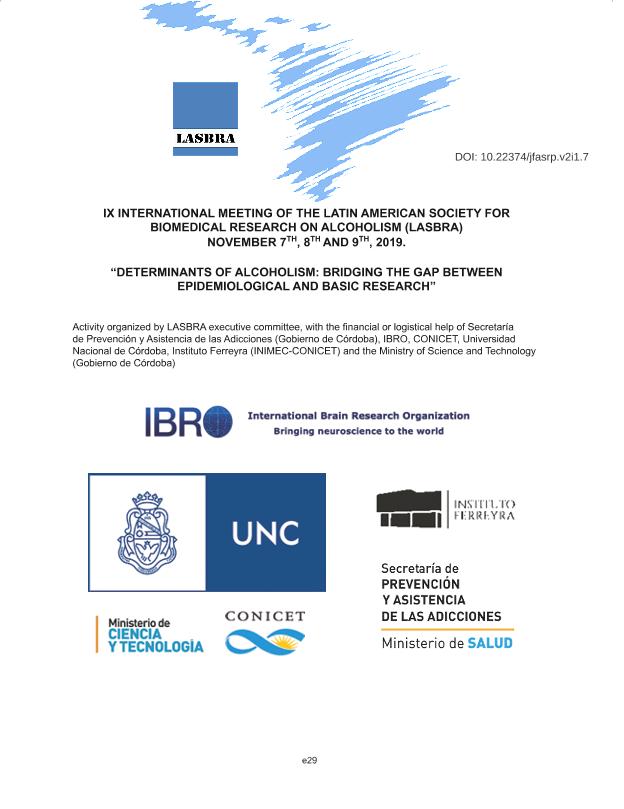Mostrar el registro sencillo del ítem
dc.contributor.author
Angulo Pereira, Rebeca
dc.contributor.author
Arpellino, Verena
dc.contributor.author
Van Gansen, Melanie
dc.contributor.author
Michelini, Yanina Noelia

dc.contributor.author
Rivarola Montejano, Gabriela Belen

dc.contributor.author
Pilatti, Angelina

dc.date.available
2022-06-14T10:16:52Z
dc.date.issued
2019
dc.identifier.citation
Alcohol protective behavioral strategies in Argentinean college students; IX Iinternational Meeting of the Latin American Society for Biomedical Research on Alcoholism; Córdoba; Argentina; 2019; e80-e80
dc.identifier.uri
http://hdl.handle.net/11336/159646
dc.description.abstract
Protective behavioral strategies (PBS) reduce or minimize the negative consequences of alcohol drinking. Previous work, conducted mostly in the U.S., showed that PBS are negatively related to alcohol outcomes and that women exhibited greater use of PBS than men did. The Protective Behavioral Strategies Scale [PBSS] is one of the most used instruments to measure this variable. The present study examined PBS use (as measured by the Protective Behavioral Strategies Scale, PBSS) in 771 freshman college students (62.1% women, M age = 19.61±3.78) from Argentina, and its association with drinking indicators and alcohol-related negative consequences. College freshman that reported alcohol use within the previous month completed an online survey that assessed alcohol use (frequency, quantity, frequency of binge drinking/drunkenness episodes), alcohol-related negative consequences and PBS. Alcohol use was highly prevalent, with 27.1% of women and 40.8% of men reporting having drinking >5 days in the previous month, and 32% (women) to 42% (men) reporting drinking >4 standard drinks of alcohol per drinking session. Women reported significantly higher number of PBS (e.g., stopping drinking at a predetermined time, avoiding drinking games, leaving the party at a predetermined time) than men did (t(769) = 2.96; p ≤ .01). A greater use of PBS was, particularly among women and particularly those describing manners of, was significantly associated with lower alcohol use (i.e., frequency and quantity of alcohol use) and alcohol-related negative consequences. The present findings, which largely replicate those found in the U.S., suggest Argentinean college women exhibited greater use of PBS than men. Despite these sex differences, a greater use of PBS was significantly associated with lower alcohol use and less alcohol-related negative consequences in both, women and men. PBS hold promise as potential targets of interventions aimed at reducing alcohol use and its associated negative consequences.
dc.format
application/pdf
dc.language.iso
eng
dc.publisher
Dougmar Press
dc.rights
info:eu-repo/semantics/openAccess
dc.rights.uri
https://creativecommons.org/licenses/by-nc-sa/2.5/ar/
dc.subject
ALCOHOL
dc.subject
PROTECTIVE BEHAVIORAL STRATEGIES
dc.subject
COLLEGE
dc.subject.classification
Otras Psicología

dc.subject.classification
Psicología

dc.subject.classification
CIENCIAS SOCIALES

dc.title
Alcohol protective behavioral strategies in Argentinean college students
dc.type
info:eu-repo/semantics/publishedVersion
dc.type
info:eu-repo/semantics/conferenceObject
dc.type
info:ar-repo/semantics/documento de conferencia
dc.date.updated
2022-06-03T13:22:35Z
dc.journal.volume
2
dc.journal.number
1
dc.journal.pagination
e80-e80
dc.journal.pais
Canadá

dc.journal.ciudad
Ontario
dc.description.fil
Fil: Angulo Pereira, Rebeca. Universidad Nacional de Córdoba. Facultad de Psicología; Argentina
dc.description.fil
Fil: Arpellino, Verena. Universidad Nacional de Córdoba. Facultad de Psicología; Argentina
dc.description.fil
Fil: Van Gansen, Melanie. Universidad Nacional de Córdoba. Facultad de Psicología; Argentina
dc.description.fil
Fil: Michelini, Yanina Noelia. Universidad Nacional de Córdoba. Instituto de Investigaciones Psicológicas. - Consejo Nacional de Investigaciones Científicas y Técnicas. Centro Científico Tecnológico Conicet - Córdoba. Instituto de Investigaciones Psicológicas; Argentina. Universidad Nacional de Córdoba. Facultad de Psicología; Argentina
dc.description.fil
Fil: Rivarola Montejano, Gabriela Belen. Universidad Nacional de Córdoba. Instituto de Investigaciones Psicológicas. - Consejo Nacional de Investigaciones Científicas y Técnicas. Centro Científico Tecnológico Conicet - Córdoba. Instituto de Investigaciones Psicológicas; Argentina. Universidad Nacional de Córdoba. Facultad de Psicología; Argentina
dc.description.fil
Fil: Pilatti, Angelina. Universidad Nacional de Córdoba. Instituto de Investigaciones Psicológicas. - Consejo Nacional de Investigaciones Científicas y Técnicas. Centro Científico Tecnológico Conicet - Córdoba. Instituto de Investigaciones Psicológicas; Argentina. Universidad Nacional de Córdoba. Facultad de Psicología; Argentina
dc.relation.alternativeid
info:eu-repo/semantics/altIdentifier/url/https://www.jfasrp.com/index.php/JFASRP/article/view/7
dc.conicet.rol
Autor

dc.conicet.rol
Autor

dc.conicet.rol
Autor

dc.conicet.rol
Autor

dc.conicet.rol
Autor

dc.conicet.rol
Autor

dc.coverage
Nacional
dc.type.subtype
Reunión
dc.description.nombreEvento
IX Iinternational Meeting of the Latin American Society for Biomedical Research on Alcoholism
dc.date.evento
2019-11-07
dc.description.ciudadEvento
Córdoba
dc.description.paisEvento
Argentina

dc.type.publicacion
Journal
dc.description.institucionOrganizadora
Latin American Society for Biomedical Research on Alcoholism
dc.description.institucionOrganizadora
Universidad Nacional de Córdoba. Instituto Ferreyra
dc.source.revista
Journal of Fetal Alcohol Spectrum Risk and Prevention
dc.date.eventoHasta
2019-11-09
dc.type
Reunión
Archivos asociados
